Events 2016
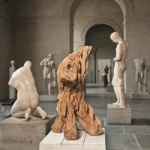
Conference – Diachronic Interculturality
November 17 to 19, 2016
Among studies in interculturality, perspectives taking into account the historical construction conditions of cultural otherness are still rare. However, if the temporal dimension is taken into account new fields of analysis are opened up that help better define the concept of interculturality. The conference focusses on this field in order to strengthen the connection between this largely cultural-studies-oriented research field and aesthetic and genuinely literary studies questions.
The conference report was published in Cornejo, Renata: Diachrone Interkulturalität, Tagung der Universität Luxemburg, 17. – 19. November 2016. In: Cornejo, Renata und Antoic Thomas u. a. (Hg.): Aussiger Beiträge. Hegemonie und Literatur(wissenschaft) – Machtstrukturen im wissenschaftlichen Feld. 10. Wien: Präsens Verlag 2016, 2.209-211.
Whilst there are numerous literary studies on migration literature and transculturally oriented contemporary literature, analyses taking into account the historical construction conditions of cultural otherness are still rare. However, the term ‘interculturality’ only seems to reach its full potential once the temporal dimension is included. This three-day conference (17-19/11/2016) therefore aims to (further) develop the diachronic and historical examination of interculturality phenomena and to better define interculturality – still all too frequently an undifferentiated concept. Furthermore, it aims strengthening the connection between this largely cultural-studies-oriented research field and aesthetic and genuinely literary studies questions. This conference, organised as part of the ‘Diachronic Interculturality’ research project, will take place at the University of Luxembourg with the support of the Key Area MIS.
Conference venue and contact details
17-19 November 2016, University of Luxembourg,
Campus Belval, Maison des Sciences Humaines, Black Box (RDC)
Dr. Eva Wiegmann, eva.wiegmann@uni.lu
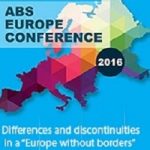
Association for Borderlands Studies Europe Conference 2016
October 4 to 7, 2016
The Association for Borderlands Studies Europe Conference 2016 was held at the University of Luxembourg from 4-7 October, organised in conjunction with the UniGR-Center for Border Studies. The guiding topic of ‘Differences and Discontinuities in a “Europe without borders’ was selected in 2014, but has not become any less relevant: the political and social events of recent years have pushed aside the idea of a Europe without borders and prompted a border revival.
These are not always territorial borders, but also (or even primarily) include invisible borders which operate as economic, social or cultural differences and discontinuities. The two keynote speakers Anne-Laure Szary (Grenoble-Alpes University) and Ulrike Hanna Meinhof (University of Southampton) examined the significance of non-territorial borders in particular and highlighted the role played by scientists and academics in investigating social phenomena.
During the four-day conference, approximately 100 participants discussed borders, differences and discontinuities in their various manifestations across a total of 18 paper sessions, structured around four key topics: mobility and multilocality, multilingualism and diversity, growth and sustainability, and instability and change. The programme also included four excursions, with experts taking conference participants to explore the border areas between Luxembourg and Belgium, Luxembourg and Germany, and Germany and France. A particular highlight was the conference dinner, part of a boat tour within the border triangle around the famous Luxembourg village of Schengen.
The work achieved was summarised by the participants in the concluding panel. They highlighted the following points as key to the further development of border studies:
Focus on non-territorial borders: The categories of difference and discontinuity also enable to investigate border demarcation processes in everyday cultural research contexts and allow a greater depth of complexity. However, a focus on non-territorial borders does not supersede the territorial dimension, as differences and discontinuities still have a constant relationship with national and spatial borders. Greater awareness of non-territorial borders helps to create a better understanding of border demarcation processes, vital given the gradual divergences anticipated in Europe.
Further opening to other disciplines: Greater consideration of non-territorial borders requires border studies to open up further to other disciplines. This exchange and dialogue should in particular be with disciplines which primarily deal with the phenomenon of ‘in-between’ and already have suitable conceptual and investigatory tools.
Decentration of borders: The categories of difference and discontinuity reinforce the process perspective involved in investigating border demarcations and border relativisations. Rather than allowing the border to be a subject, they instead enable it to be understood and examined as a multidisciplinary process which materialises in the form of visible borders. This altered analytical perspective allows border studies to also explore border demarcations and border relativisations within national societies.
Comparative perspective and stronger theoretical foundation: The field of border studies is characterised by what has now become an unmanageable number of empirical studies in various different spatial study contexts. In the future, the knowledge thus attained should be subject to greater interconnection from a comparative perspective, in order to gain a better understanding of border demarcations and border relativisations. In addition, this seems to offer the possibility of generating further theoretical foundations and thus positioning border studies on a solid theoretical base.
Strengthening critical perspectives: Taking a critical perspective on the investigation of border demarcation processes is vital, in particular given current events in Europe. This perspective involves considering the role of scientists and academics in the research process and the communication of research findings. It also relates to the development of research questions, which should demonstrate greater sensitivity to the balance of power as well as to the exploitation of (constructed) differences and discontinuities.
The Association for Borderlands Studies’ next Europe Conference will form part of the ABS World Conference 2018 in Vienna/Budapest.

Migration in the media: a comparative study of the European Saarlorlux border region
October 26, 2016; 16:30h University of Luxembourg, Campus Belval, Maison des Sciences Humaines, Black Box (GL)
Elena Kreutzer’s lecture examines media discourse on migration in Saarland, Lorraine and Luxembourg. European migration and asylum policy between 1990 and 2010 serves as the starting point for a comparison of the different regions. Christophe Langenbrink of Luxemburger Wort will comment on the lecture as a representative of the media.
Lecture by Elena Kreutzer (Institut für Sozialforschung und Sozialwirtschaft e. V.)
Discussant: Christophe Langenbrink (Luxemburger Wort)
What are the characteristic features of the media’s migration discourse in a subnational cooperative space? Elena Kreutzer uses this question to examine the European border region between Saarland, the French region of Lorraine, and Luxembourg (SaarLorLux) – the largest border region in Europe – during the establishment of European migration and asylum policy in the period from 1990 to 2010. Her comparison of high-circulation print media shows that media discourses reflect the differences of the surrounding national system contexts in their journalistic presentation, subject agendas and key players involved, whilst at the same time also sharing a basic foundation of international ways of thinking.
Elena Kreutzer completed a doctorate at the University of Luxembourg and the University of Saarland in 2015 on the topic of migration in the media of the SaarLorLux region. Since September 2016 she has been working as a social scientist at the Institut für Sozialforschung und Sozialwirtschaft e. V. (iso Institute) in the fields of occupational & industrial sociality and service & innovation research. She is the author of the book ‘Migration in the Media: A Comparative Study on the European SaarLorLux Border Region’ (transcript, October 2016).
Christophe Langenbrink studied political science, intercultural communication and Romance studies in Saarbrücken and Quebec and works for Luxemburger Wort as an editor and journalist specialising in international politics and the Greater Region. He is a member of the main editorial board in his role as the current head of planning for the daily newspaper. Since 2015 he has also been Vice President of the Conseil de Presse Luxembourg.
This lecture is aimed at an interested general public and will be given in German. Free entry.
A lecture organised by the Key Research Area MIS – Multilingualism and Intercultural Studies (www.mis.lu) and the UniGR-Center for Border Studies (www.borderstudies.org).

Dangerous memories? – Benjamin Stora and Alexis Jenni in conversation
April 20, 2016
French historian Benjamin Stora will be visiting Luxembourg on 14 June to discuss the difficulties of dealing with France’s colonial past with author Alexis Jenni. This public event will be held at 7 p.m. at Neumünster Abbey, and is being organised by the Institute Pierre Werner in collaboration with the Key Area MIS.
Despite the colossal work accomplished by historians in the field of postcolonial studies over the past two decades, French society still appears to struggle to teach and pass on its colonial history: memories regarding this period do not yet seem to have been appeased.
As a result, today we are seeing a new type of memory partitioning which takes the form of a communitisation of memory, with some historians even talking of a ‘colonial fracture’.
In order to construct a shared, appeased history despite its weight of contradictions, we still need to return to this colonial past which can only be calmly identified by taking stock – in other words by confronting, discussing and understanding it, a process enabling us to better weight the issues of the modern world.
In order to achieve a better understanding of this silence, this occultation, this self-censorship of colonial memory, the source of numerous identity crises, IPW and the Key Area MIS are presenting a dialogue between a novelist and a historian – Alexis Jenni and Benjamin Stora – who recently co-authored a work on the topic of Dangerous Memories (Éditions Albin Michel).
Their dialogue is an invitation to join a decisive cultural fight to break away from the violence and ‘fracture’ of memories and ultimately successfully confront the issues of the present by calmly taking account of history. These two men thus offer a better understanding of current cultural tensions, compounded by the Paris attacks in January and November 2015.
Organised by the Institute Pierre Werner in partnership with the Key Research Area MIS – Multilingualism and Intercultural Studies (University of Luxembourg)
With the support of Neumünster Abbey
Tuesday 14 June 2016 | 7 p.m. | Neumünster Abbey
In French | €10 / €5 | Tickets: +352 26 20 20 52-444

MIS Symposium 2016 – Borderscape as an Interdisciplinary Concept
April 8 & 9, 2016
Following a workshop held in March 2015, the colloquium ‘Borderscape as an Interdisciplinary Concept’ was held on 8 and 9 April 2016 at the University of Luxembourg. It was organised by the Key Area MIS in conjunction with the UniGR-Center for Border Studies. The aim of the colloquium was to examine the potential of the ‘borderscape’ concept for theoretical and programmatic debate, as well as for empirical analysis of border phenomena. A detailed account of the colloquium is available here..
Keynote Speaker: Chiara Brambilla
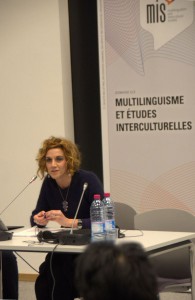
Chiara Brambilla (University of Bergamo), the first guest speaker, set out to explore the conceptual and methodological potential of the ‘borderscape’, thus establishing the reflective framework for the colloquium as a whole. As an anthropologist she is interested in anti-hegemonic cultural experiences within the Mediterranean border area, and spoke to the need to undertake this research and invent new conceptual tools.
Session I: aesthetics and borders
The first session focused primarily on the relationship between aesthetics and borders. Anne Sturm (University HI. Kyrill and Method) compared two novels falling into the category of ‘migrant literature’ written by authors who fled Bulgaria for Germany: Ilija Trojanow and Dimitré Dinev both tell the story of characters who decide to cross the German border, a passage involving an existential change which the researcher likened to crossing the Styx in the ancient world. Art historian Pamela Bianchi (University of Paris 8) was interested in various artists who play on ‘museographical borders’; she applied the concept of the ‘borderscape’ to the exhibition space for contemporary art. Finally, Juan-Manuel Trillo-Santamari and Valeria Paül (University of Santiago de Compostela) offered up an examination combining geography with literature, and introduced the fertile concept of ‘border poetics’ which brings together ‘border studies’ and ‘landscape literature’.
Session II: education and borders
The presentations of the second session examined borders in terms of their relationship with education and didactics. Machteld Venken (University of Vienna) was interested in how education is organised in the German-speaking regions lost by Germany following the Treaty of Versailles. Cléa A. Schmidt (University of Manitoba) examined the different barriers faced by migrant teachers in the province of Manitoba in Canada. She strongly advocated going against the conservative ideology which imposes a teaching ideal that does not match reality and forces migrants to assimilate Canadian linguistic criteria.
Session III: aesthetics and borderscapes
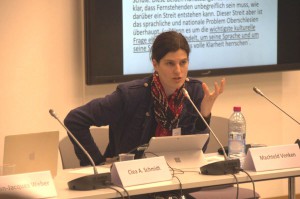
The third session looked at the question of the relationship between aesthetics and the ‘borderscape’. Dorothée Cailleux (University of Paris Ouest Nanterre la Défense) adopted a geocritical perspective where literary creation becomes a form of ‘borderscaping’. The researcher examined how the works of Günter Grass have helped to transform the perception of border landscapes such as the town of Danzig, reunified Germany, and the German-Polish border. Regina Range (University of Alabama) undertook a study of geographical and ideological borders in relation to the question of feminism as presented by filmmaker Gina Kaus: Kaus’s narratives depict exile and border-crossing as an opportunity, a tactic enabling self-reinvention.
Keynote Speaker: Ana Maria Manzanas-Calvo
The second guest speaker Ana Maria Manzanas-Calvo (University of Salamanca) provided an analysis of two films (Babel and Sleep Dealer) in relation to the concept of the ‘borderscape’, for which she presented a cartography made up of various happy metaphors. A border thus becomes a ‘mutant’ which changes according to the person seeking to cross it. This idea recalls the fundamental inequality of ‘free movement’: the number of countries accessible to a person varies according to the passport they hold. The researcher argued that borders also represent places of the abject, in other words places where meaning breaks down: in consequence, combatting a ‘borderscape’ as a ‘powerscape’ means putting hospitality front and centre as an attitude which blurs and ‘disables’ borders.
Keynote Speaker: Isabel Marcos
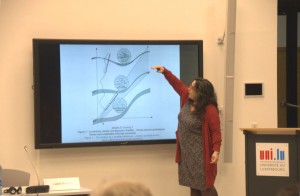
Guest speaker Isabel Marcos (New University of Lisbon) favoured the term ‘mise-en-frontière’ (‘bordering’) rather than ‘borderscape’. The concept must be considered within the context of its spatial and temporal deployment, combining the physical with meaning; in other words, a border is conceived as a dynamic, layered morphology which is deployed in space and time, prompting the semiotician to draw on René Thom’s semio-physical approach for her analyses.
Session IV: us/them as borderscaping
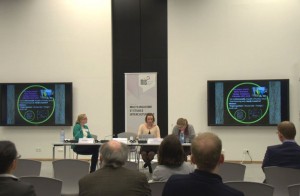
The presenters of the fourth session focused on the more minority topics of waste and prostitution. Kateryna Pashkovska (University of Alberta) presented her ethnographical research completed in the Republic of Karelia: her project revealed that the everyday recycling habits a person adopts correlate with their level of integration in their neighbourhood. The categorisation of us/them is here based on inhabitants’ environmental practices. Simone Sauer-Kretschmer (Ruhr University Bochum) investigated how the media, TV series and literature convey a particular image of prostitution. Whilst the eternal debate on this topic can be summed up in the dichotomy of ‘for or against’, writers such as Clemens Meyer give prostitutes a voice in their novels. The TV series The Team examines prostitution through the prism of the ‘borderscape’, inasmuch as it depicts the issue of human trafficking within Europe itself.
Session V: national and religious borders
The colloquium’s final session opened with a presentation from Mary Rose Sarausad (Asian Institute of Technology) focusing on how migrant workers in southeast Asia are forced to constantly get round current immigration legislation as they cross borders. Migrants in Thailand never receive visas for indeterminate periods, but instead have to constantly undertake ‘border runs’ to obtain a stamp in their passport from a neighbouring country which enables them to extend their stay. Medievalist Felix Prautzsch (Technische Universität Dresden) was interested in borders between religions in the Middle Ages: a border in particular translated as the antagonism between Christians and non-believers, one which still permeates our imaginations today. By studying the legends of various saints (in particular the Legenda Maior), he determined that these borders were never static, undergoing particular rearrangement during the Crusades.
Program
April 8, 2016
09:30-10:00 – Opening
Georg Mein (Dean of the Humanities Faculty, University of Luxembourg)
Nathalie Roelens (Key Area MIS, University of Luxembourg)
Christian Wille (UniGR-Center for Border Studies)
10:00-11:00 – Keynote Speaker
Exploring the Conceptual and Methodological Potential of the Borderscaping Approach: With a Focus on the Border-Migration Nexus in the Mediterranean
Chiara Brambilla (University of Bergamo, Italy)
Moderation: Nathalie Roelens (University of Luxembourg)
11:00-12:30 – Session I
Chair: Iulia-Karin Patrut (Europe University Flensburg, Germany)
Literarische Grenzziehungen und -überschreitungen bei Ilja Trojanow und Dimitré Dinev
Anne Sturm (University HI. Kyrill and Method, Bulgaria)
Ne pas franchir la ligne : les frontières muséographiques et leurs seuils traversés
Pamela Bianchi (University Paris 8, France)
Reflections on Border(land)scapes and border poetics through the Galician-Portuguese border
Juan-Manuel Trillo-Santamaría, Valerià Paül (University of Santiago de Compostela, Spain)
01:30-02:30 – Session II
Chair: Jean-Jacques Weber (University of Luxembourg)
Language learning as borderscaping process in interwar European borderlands
Machteld Venken (University of Vienna, Austria)
Transgressing professional, cultural, and linguistic borders through plurilingualism and identity negotiation: A critical case study of migrant teachers from Canada
Clea A. Schmidt (University of Manitoba, Canada)
02:30-03:30 – Session III
Chair: Oliver Kohns (University of Luxembourg)
Günter Grass et la frontière ou la création littéraire comme forme de “borderscaping”
Dorothée Cailleux (University of Paris Ouest Nanterre la Défense, France)
Pushing Boundaries, Shifting Perspectives – Grenzgängerin Kaus
Regina Range (University of Alabama, USA)
04:00-05:00 – Keynote Speaker
Inflecting Borderscapes: Space and Movies
Ana Maria Manzanas-Calvo (University of Salamanca, Spain)
Moderation: Astrid Fellner (Saarland University, Germany)
05:00-06:30 – Screening
Screening of the documentary film “Houdoud al bahr – The Mediterranean Frontiers: Mazara-Mahdia”
Introduction: Chiara Brambilla (University of Bergamo, Italy)
Moderation: Agnès Prüm (University of Luxembourg)
April 6, 2016
10:15-11:15 – Keynote Speaker
La théorie sémiophysique de René Thom permet-elle de comprendre autrement le concept de frontière?
Isabel Marcos (CICS.NOVA, FCSH, New University of Lisbon, Portugal)
Moderation: Christian Wille (University of Luxembourg)
11:15-12:15 – Session IV
Chair: Birte Nienaber (University of Luxembourg)
Garbage at the Threshold: Sorting Out Nesting Borderlands in Karelia
Kateryna Pashkovska (University of Alberta, Canada)
Ein grenzenloser Fall: Prostitution und Frauenhandel als ‘europäische Bewegung’ in der TV-Serie “The Team”
Simone Sauer-Kretschmer (Ruhr University Bochum, Germany)
01:15-02:15 – Session V
Chair: Nathalie Roelens (University of Luxembourg)
At the Crossroads? Border Crossings and the Boundaries of Legality
Mary Rose Sarausad (Asian Institut of Technology, Thailand)
Heilige und Heiden – Konstitution und Dynamik religiöser Grenzen
Felix Prautzsch (Technische Universität Dresden, Germany)
02:15-02:45 – Synthesis: Borderscape as an Interdisciplinary Concept
Julia de Bres (University of Luxembourg)
Agnès Prüm (University of Luxembourg)
Scientific Committee
Dr. Till Dembeck, Assoc. Prof. Dr. Sonja Kmec, Assoc. Prof. Dr. Birte Nienaber, Agnès Prüm, Prof. Dr. Nathalie Roelens, Dr. Christian Wille
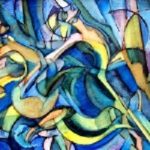
Performance – Eduardo Vernazza’s Dancing Line
March 3, 2016
On 3 March 2016 at 19h, a dance performance entitled “Eduardo Vernazza’s Dancing Line: Cosmopolitan Smuggler, Catalyst for new Forms” will be given at Banannefabrik in Bonnevoie. This MIS event is a collaboration with the Centre de Création Chorégraphique Luxembourgeois (TROIS C-L) organised by Nathalie Roelens, Serge Wolf and Laura Di Ronco.
Uruguayan artist Eduardo Vernazza (1910-1991) moves between cultures, between figurative and abstract art, between the real and the imaginary, constantly seeking the motion, rhythm and pure sensation specific to dance, the universal language going beyond idiom. A stage show illustrator for the Montevideo daily El Día, he gradually extracted the juice of contemporary dance from its conventional straightjacket, driven by both avant-garde European groups touring Uruguay and local tango and candombe. Like an immense game of cultural hopscotch, Vernazza invites us to jump into the new with both feet.
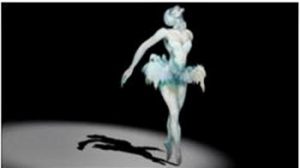
Our polyphonic and inter-artistic performance gives life and form to Vernazza’s two-dimensional drawing and painting through the animated films which Dennis Doty dedicated to the painter, and through the third dimension missing from other arts – namely depth – which only danced movement (presented by Laura Di Ronco) can transcend.

MIS conference series – Europe was also shaped by religions…
December 2, 2015 to May 12, 2016
European cultures are shaped by various religions and their influences. The guest speakers at this conference series present key religious and philosophical trends of the past and present and discuss their contribution to an intercultural and multicultural Europe. The conference series is being organised by the MIS Key Area in conjunction with the Institute Pierre Werner.
We do not have one single European culture, but rather multiple European cultures. These cultures are influenced by each other, creating features common to all cultures on the European continent. Some of the traditions behind the shaping of these cultures are the major religions: Christianity with its denominational plurality, Judaism with its painful experience of an often persecuted minority, and Islam which has long been relegated to the margins of the continent, as well as atheism denying the need for any believe in a divine being, and agnosticism with doubt as a maxim for life.
Through gatherings of experts and debates bringing together representatives with different beliefs, this conference series aims to highlight the role of major religious and philosophical trends in creating an intercultural and multicultural Europe.
Program
02/12/2015
Marc De Kesel (University of Ottowa)
Europe, mon amour : politique et religion en Occident
14/01/2016
Volker Leppin (University of Tübingen)
Die innere Pluralität des Christentums im späten Mittelalter
18/02/2016
Guido Bellatti Ceccoli (Ambassador of the Republic of San Marino to the Council of Europe and member of ICLARS (International Consortium for Law and Religious Studies))
L’Islam vu depuis l’Occident chrétien du moyen âge à nos jours
12/05/2016
Literary discussion panel with Navid Kermani and Mathias Énard
Moderator: Guy Helminger
Further information →

